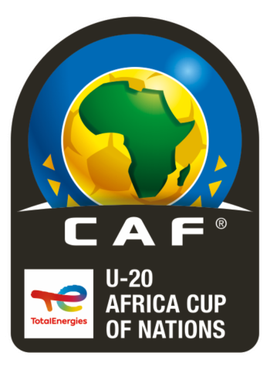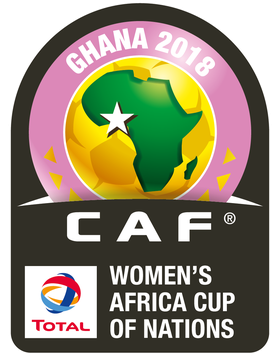
The Africa Cup of Nations referred to as AFCON, and sometimes as African Cup of Nations, is the main international men's association football competition in Africa. It is sanctioned by the Confederation of African Football (CAF), and was first held in 1957. Since 1968, it has been held every two years, switching to odd-numbered years in 2013.

The Confederation of African Football, or CAF for short, is the administrative and controlling body for association football, futsal and beach soccer in Africa. It was established on 8 February 1957 at the Grand Hotel in Khartoum, Sudan by the national football associations of Egypt, Ethiopia, South Africa and Sudan, following formal discussions between the aforementioned associations at the FIFA Congress held on 7 June 1956 at Avenida Hotel in Lisbon, Portugal.

The Nigeria national football team represents Nigeria in men's international football. Governed by the Nigeria Football Federation (NFF), they are three-time Africa Cup of Nations winners, with their most recent title in 2013. In April 1994, the Nigerian national football team was ranked 5th in the FIFA rankings, the highest FIFA ranking position ever achieved by an African football team. Throughout history, the team has qualified for six of the last eight FIFA World Cups, missing only the 2006 edition and 2022 edition. They have reached the round of 16 on three occasions. Their first World Cup appearance was the 1994 edition. The team represents FIFA and Confederation of African Football (CAF).
The Algeria women's national football team represents Algeria in international women's football. The team is currently ranked 76th in the world in the FIFA women's rankings. The team's highest ranking was 64th, in June 2009. The team plays its home games at the Stade du 5 Juillet in Algiers and is coached by Radia Fertoul since August 2018. Algeria played its first match on May 14, 1998, against France, and lost 14–0.
The 2010 African U-17 Women's World Cup Qualifying Tournament was the second edition of the African U-17 Cup of Nations for Women and the first edition of this under-17 qualification tournament new format. The biennial international under-17 football competition organised by the Confederation of African Football (CAF) to determine which women's under-17 national teams from Africa qualify for the FIFA U-17 Women's World Cup.
The 2010 African U-20 Women's World Cup Qualifying Tournament was the 5th edition of the African U-20 Women's World Cup Qualifying Tournament, the biennial international youth football competition organised by the Confederation of African Football (CAF) to determine which women's under-20 national teams from Africa qualify for the FIFA U-20 Women's World Cup.

The African Nations Championship, known as the TotalEnergies African Nations Championship for sponsorship purposes, is a biennial African national association football tournament organized by the Confederation of African Football (CAF) and first announced on 11 September 2007. The participating nations must consist of players playing in their national league competitions.
The African U-17 Cup of Nations for Women is association football tournament for the under 17 teams, that is held every two years, and serves as a qualifying competition for the FIFA U-17 Women's World Cup.
The 2012 African U-20 Women's World Cup Qualifying Tournament was the 6th edition of the African U-20 Women's World Cup Qualifying Tournament, the biennial international youth football competition organised by the Confederation of African Football (CAF) to determine which women's under-20 national teams from Africa qualify for the FIFA U-20 Women's World Cup.

The U-20 Africa Cup of Nations also called TotalEnergies U-20 Africa Cup of Nations for sponsoring reason is the main international youth football competition for CAF nations, and is competed for by under 20 year olds. It is held every two years with the top 4 teams qualifying for the FIFA U-20 World Cup.
The 2014 African U-20 Women's World Cup Qualifying Tournament was the 7th edition of the African U-20 Women's World Cup Qualifying Tournament, the biennial international youth football competition organised by the Confederation of African Football (CAF) to determine which women's under-20 national teams from Africa qualify for the FIFA U-20 Women's World Cup.
The 2016 African U-17 Women's World Cup Qualifying Tournament was the 5th edition of the African U-17 Women's World Cup Qualifying Tournament, the biennial international youth football competition organised by the Confederation of African Football (CAF) to determine which women's under-17 national teams from Africa qualify for the FIFA U-17 Women's World Cup. Players born on or after 1 January 1999 were eligible to compete in the tournament.
The following article is a summary of the 2016 football season in Kenya, which was the 52nd competitive season in its history.

The 2018 Women's Africa Cup of Nations was the 13th edition of the Africa Women Cup of Nations, the biennial international football championship organised by the Confederation of African Football (CAF) for the women's national teams of Africa. The tournament was held in Ghana, from 17 November to 1 December 2018.
The 2018 African U-20 Women's World Cup Qualifying Tournament was the 9th edition of the African U-20 Women's World Cup Qualifying Tournament, the biennial international youth football competition organised by the Confederation of African Football (CAF) to determine which women's under-20 national teams from Africa qualify for the FIFA U-20 Women's World Cup.
The 2018 African U-17 Women's World Cup Qualifying Tournament was the 6th edition of the African U-17 Women's World Cup Qualifying Tournament, the biennial international youth football competition organised by the Confederation of African Football (CAF) to determine which women's under-17 national teams from Africa qualify for the FIFA U-17 Women's World Cup.
The 2020 African U-17 Women's World Cup Qualifying Tournament was the 7th edition of the African U-17 Women's World Cup Qualifying Tournament, the biennial international youth football competition organised by the Confederation of African Football (CAF) to determine which women's under-17 national teams from Africa qualify for the FIFA U-17 Women's World Cup. Players born on or after 1 January 2003 were eligible to compete in the tournament.
The 2020 African U-20 Women's World Cup Qualifying Tournament was the 10th edition of the African U-20 Women's World Cup Qualifying Tournament, the biennial international youth football competition organised by the Confederation of African Football (CAF) to determine which women's under-20 national teams from Africa qualify for the FIFA U-20 Women's World Cup. Players born on or after 1 January 2000 were eligible to compete in the tournament.
The 2022 African U-20 Women's World Cup Qualifying Tournament was the 11th edition of the African U-20 Women's World Cup Qualifying Tournament, the biennial international youth football competition organised by the Confederation of African Football (CAF) to determine which women's under-20 national teams from Africa qualify for the FIFA U-20 Women's World Cup. Players born on or after 1 January 2002 were eligible to compete in the tournament.
The 2022 African U-17 Women's World Cup Qualifying Tournament was the 8th edition of the African U-17 Women's World Cup Qualifying Tournament, the biennial international youth football competition organised by the Confederation of African Football (CAF) to determine which women's under-17 national teams from Africa qualify for the FIFA U-17 Women's World Cup. Players born on or after 1 January 2005 were eligible to compete in the tournament.





